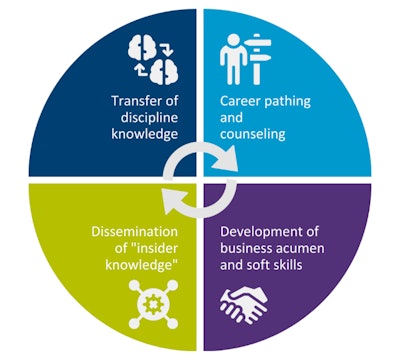
Amid all the self-paced training courses, instructional videos and other knowledge resources organizations make available to their supply chain employees, it would be natural to wonder whether a high-touch approach like traditional mentoring still has a role to play in learning and development. APQC’s research has shown that mentoring can be incredibly effective if done well.
Mentoring not only speeds up time-to-competency for employees learning the nuts and bolts of a new area, but also plays an important role in helping employees establish and grow their professional networks. More fundamentally, the human connections forged through mentoring help employees feel more confident and satisfied in their roles, which in turn drives higher engagement, job satisfaction and retention—all of which are especially critical during periods of disruption and ongoing changes.
For mentoring to be effective, organizations need to articulate a clear vision for how their mentoring programs will benefit not only the mentee (i.e., the employee being mentored) but also the mentor (i.e., the employee providing the mentoring) and the organization more broadly. Outlining specific mentee, mentor and business goals ensures that mentoring enables employees to learn what they need to learn while satisfying the broader needs of the organization.
There are Top 4 common types of mentoring relevant for supply chain:
1. Transfer specific knowledge,
2. Provide career pathing and counseling,
3. Develop business acumen and soft skills, and
4. Disseminate “insider knowledge.”
Business purposes of workplace mentoring
Each of these types of mentoring aims at a different purpose. Getting clear on what type of mentoring program you plan to build, why you need it and the goals you hope to accomplish is critical for getting those most out of these relationships.
 APQC
APQC
Transfer specific knowledge
Some organizations develop mentoring initiatives to facilitate the transfer of knowledge in a specific topic or functional area from one employee to another. This form of mentoring is particularly common among technical mentoring programs, which are designed to mitigate skills shortages and help STEM (science, technology, engineering and math) employees apply what they learned in school to the daily work of the business.
This form of mentoring benefits the mentee, mentor and the organization in several ways. Learning from subject matter experts can help the mentee decrease his or her time-to-competency, especially if the mentee is a recent graduate or new hire. This form of mentoring can also help fill specific knowledge or skills gaps related to an employee’s current role and prepare the employee for advancement into future roles and responsibilities. The mentor, meanwhile, gets to play the role of subject matter expert and impart his or her wisdom to a new generation of employees.
Knowledge transfer mentoring also helps the organization improve workforce and succession management as well as mitigate skills shortages across the supply chain. More fundamentally, it helps the organization avoid the loss of critical organizational knowledge by ensuring that know-how gets passed to a new generation of employees rather than going out the door when employees retire or leave. Career pathing and counseling
Many organizations recognize that employees prefer to approach their more experienced peers, rather than HR or a manager, for career guidance and advice. These mentors can help a newer employee to get candid, objective advice on work opportunities and challenges and develop relationships with colleagues across the organization. As employees grow their skills toward their chosen career path, checking in with a mentor helps them make sure they are on the right track and provides an opportunity to talk through blockages and obstacles that the mentor may have experience overcoming.
Organizations benefit from this form of mentoring because it can help increase employee retention and boost satisfaction and engagement. Employees are less likely to leave if they have found the right “home” within the organization and have an opportunity to talk with someone who can help guide them toward it. For mentors, reflecting on their own career histories and helping to guide other employees can be valuable experiences.
Develop business acumen and soft skills
APQC research has consistently found business acumen and soft skills to be among the most important and highly demanded skill sets across the supply chain. Mentoring programs that help employees build these skills are sometimes included as part of a larger development program (for example, a leadership development program for high-potential employees), but can also work as standalone mentoring initiatives.
Mentoring relationships aimed at soft skills can help employees develop leadership and program management skills; collaborate, communicate and resolve conflict more effectively; think critically and strategically; and build professional networks. These skills and aptitudes will benefit an employee regardless of their current role or function. Organizations that develop these skills in employees benefit from higher-quality leaders, an improved working environment and increased employee satisfaction. Mentors that can teach these skills show themselves to be valuable to the organization because they play a key role in developing up-and-coming leaders and equipping employees across the organization with valuable skills.
Disseminate “insider knowledge”
Important facets of organizational culture often go unstated and remain in the realm of implicit knowledge. New employees, for example, may initially struggle to understand an organization’s structure and how the component parts fit together, the right person to talk to about company benefits or where to find insight into undocumented processes. On a more basic level, new employees may just need to learn “how things work around here”—in other words, where to park or not park; where to eat lunch; and countless other norms that structure daily life in an organization. Mentoring can take that deeply-embedded, organization-specific and implicit knowledge and make it explicit for newer employees.
In the most common version of this type of mentoring, a new employee is assigned to an established employee through a “buddy program.” This helps ensure the employee knows at least one person who can answer his or her questions and help him or her learn how to navigate daily life in the organization. Mentors get to impart valuable wisdom to newer employees and grow their own professional networks. The organization also benefits from better cross-boundary collaboration and increased employee satisfaction and retention.
Click here to hear more about professional development:
Key takeaways
Mentors can help send a powerful message to supply chain employees that whatever challenges they are facing, others have gone before them and have come out the other side successfully. Hearing wisdom and practical tips from veteran employees helps mentees feel more connected and empowered, and mentors also enjoy being in a position to dispense that wisdom and grow a new generation of employees. There is truly no self-paced training course or how-to article that can replace those relationships.
To get the most out of your supply chain mentoring initiative, make sure you can clearly articulate why it is needed, the goals at which it aims and the benefits that the mentor, mentee and organization can expect to receive from the relationships. When everyone is on the same page about these goals and benefits, mentoring can be very effective and rewarding for everyone involved.


![Pros To Know 2026 [color]](https://img.sdcexec.com/mindful/acbm/workspaces/default/uploads/2025/08/prostoknow-2026-color.mduFvhpgMk.png?auto=format%2Ccompress&bg=fff&fill-color=fff&fit=fill&h=100&q=70&w=100)







![Pros To Know 2026 [color]](https://img.sdcexec.com/mindful/acbm/workspaces/default/uploads/2025/08/prostoknow-2026-color.mduFvhpgMk.png?ar=16%3A9&auto=format%2Ccompress&bg=fff&fill-color=fff&fit=fill&h=135&q=70&w=240)









